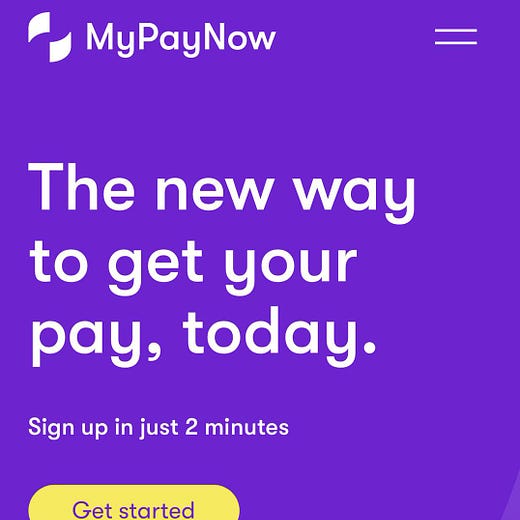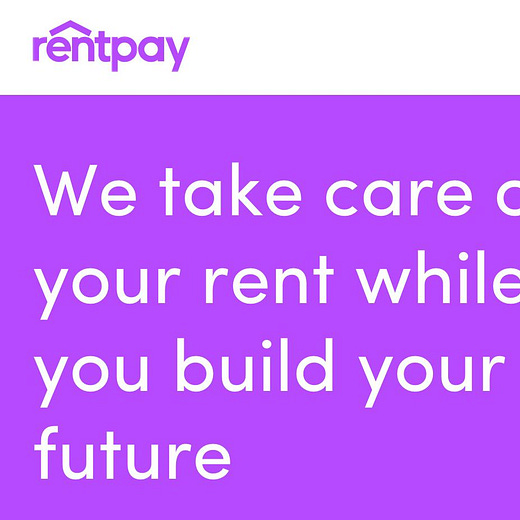No interest
The murky world of buy now, pay later
The last two years has seen a surge of businesses and platforms pop up in Australia surfing Afterpay’s wake and more or less offering exactly the same service — “interest-free", short-term credit — dressed up and sold a thousand different ways.
The pitch and intended audience tends to differ (marginally) between companies, but the branding tends to coalesce around the exact same blandly bright colours and rounded edges, a kind of minimalist Australian execution of Corporate Memphis. They all have names which are random assemblages of words like ‘pay’, ‘now’, before’, ‘after’ and ‘it’.
You’ve seen these companies. To wit:
This collection of strange digital shopfronts are crawling up from the abyss alongside a group of somewhat more established, B-tier buy now, pay later (BNPL) companies, like Humm, Zip, Laybuy and Bundll; as well as BNPL offerings from bigger firms and fintechs like the Commonwealth Bank, PayPal, Klarna, and so on.
As I said, all of these companies are offering the same product at the end of the day. Generally targeting millennials and Gen Z, these companies will front the cost of a purchase to the merchant at checkout, and then reclaim the money in four interest-free payments from the consumer. Fees are incurred for late payments, and are generally capped. Credit checks are broadly non-existent, with these companies arguing that they are inflexible and irrelevant for a new breed of consumers. (Stop me if you’ve heard that argument before.)
There are variations on the theme. Rentpay, for example, targets tenants with the promise of ‘syncing’ their rent and pay cycles by holding their money in an account for them. Once that relationship is established, it offers short-term loans in the guise of the hilariously-named ‘SafetyNet’, which technically incurs no interest but charges an activation fee, a monthly fee, and a fortnightly repayment fee across the period of the loan.
Others target specific industries. Inkpay, which bills itself as “the world's first multi-functional technology platform for the global tattoo industry”, really offers just one function: letting you pay off a tattoo in interest-free instalments over six weeks. “We don't do credit checks, nor will we judge your past,” its website reads, somewhat ominously.
Several players in the space, like MyPayNow and Beforepay, ingratiate themselves into the BNPL ‘vibe’ while operating more explicitly as a new generation of payday lender. Of course, they prefer to give their products slicker fintech-y monikers like ‘pay on demand’ or, most outrageously, ‘real-time wages’. In this new telling, you’re not taking something as serious and inflexible as a loan. You’re simply changing your pay schedule to fit your needs.
This resistance to calling a spade a spade is deliberate game of regulatory chicken played from the top down. Afterpay, for example, does not like being called ‘credit’. Being named as such comes with all sorts of legal obligations, like performing credit checks. It prefers to be called a ‘customer acquisition tool’ or a ‘marketing platform’, both labels undermined by the fact it has a vast loan book going at any given time.
This problem is compounded by the fact the sector is only ever a bee’s dick away from being regulated out of existence. Many of these players forbid merchants from passing their hefty fees onto customers, and the threat looms that governments might make such a prohibition illegal. That should scare them, per this Reserve Bank of Australia report from March:
Around half of BNPL users reported that they would switch to an alternative payment method if faced with a hypothetical surcharge on BNPL payments; 40 per cent said they would pay the surcharge and around 10 per cent said that they would cancel the purchase.
Well, there’s sixty percent of your sales base gone. Good luck with that.
Afterpay’s customer, in its own telling, is the merchant. In exchange for a flat transaction fee plus a commission between 3 - 7% of the total sale price, Afterpay provides a customer who wouldn’t have made the purchase otherwise. That’s the pitch, at least. Anecdotally, people who work in e-commerce have told me that Afterpay does in fact drive appreciable traffic via its directory and provides access to customers who are otherwise priced out and are less inclined toward traditional credit products. Millennials and Gen Z, in other words.
Zero-interest loans at checkout inevitably also draw in customers who think “why the fuck not?” Case in point: I was looking for a new TV earlier this year, and ended up buying from Bing Lee after making a Google search for the particular model I was after and making a decision purely based on price. I had the money to buy it outright, but saw the store offered Afterpay — so I thought “why the fuck not?” and used it. For Bing Lee, this is a mortifying sales pipeline: not only did I visit the site from a search ad placement, I then used Afterpay to complete the purchase, meaning there are at least two parties clipping the ticket before Bing Lee nabs the remaining margin.
The point I’m getting at here is that the fees situation is pretty tenuous here. Firstly, it’s clear that customers are pretty strongly uninterested in paying for the service, and will generally elect not to given the choice. Secondly, the value proposition for merchants to swallow the cost has to be very plain. I’m not sure that it is. Yes, Afterpay’s growth has been largely driven by a savvy campaign to get fans to demand merchants support the platform. I’m not sure whether that value proposition remains clear with Afterpay taking such a punishing cut, and I definitely don’t see it for the legion of clones.
Those clones multiply in Australia like cave fungi precisely because of our relatively light touch on regulation, at least for now. We don’t mandate caps on late fees1, for example, unlike the United Kingdom, which has flagged a much stronger stance on the BNPL sector generally.
Australia, on the other hand, is explicitly taking a wait-and-see approach. The Senate Select Committee on Financial Technology and Regulatory Technology, which intended to find out whether these companies could use some tighter regulation, found that because “buy now, pay later often occurs on the fringes of regulation, it is inappropriate to force each innovation into a one-size-fits-all approach."
Reading between the lines, the obvious implication is this: Australia is actually on the frontline of some tech innovation for once, so let’s not fuck it up.
The question of interest rates
When we’re looking back on our current era, picking through the wreckage and bayoneting the wounded, we’re going to observe that much of the ‘innovation’ of this era can be put down to the snowballing effect of persistent low interest rates since the late aughts. Some of these effects are obvious: from exploding house prices to zombie companies shambling along thanks to the free availability of credit, to soaring crypto and stock prices led in no small part by retail investors looking for somewhere to park their money productively away from anaemic savings accounts. The technological ‘innovation’ is often just some kind of arbitrage or ticket-clipping.
These companies are quite obviously part of the same universe. The business model of offering interest-free loans only really works — and it doesn’t actually seem to be quite working just yet, if Afterpay and Zip’s earnings reports are any indicator — where the providers are able to access more or less free money themselves to loan it out. Or, as a recent Macquarie analyst report put it: “BNPL is a low interest rate play, giving providers access to cheap money. This won’t last forever.”
There are obvious signs that the top dogs, like Afterpay and Zip, are eyeing other opportunities other than simply becoming huge in the US and hoping that papers over weaknesses in the business model. Afterpay is building a banking app, whereas Zip is eyeing a move into crypto and stock trading — the latter of which, to be honest, feels like a euphemism these days for “we are about to collapse”.
Those moves might work for the big cheeses of the industry (though even that is questionable when titans like PayPal move into the space) but I don’t hold much hope for the rest of them. We’ll just have to bid goodbye to MyCashPayNowOnDemand and its ilk.
Thank you for reading my unfiltered thoughts on BNPL. If you landed here from a link and liked it, you can subscribe below.
This has opened the door to the local BNPL industry setting its own late fee caps as part of a ‘self-regulation’ effort.






Thanks for writing this - really interesting. The only point I would add is the lack of regulatory action being driven by the need to keep consumer confidence levels high over literally anything else, at least for the next couple of election cycles.